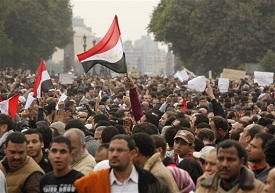| Home | Blog | Ask This | Showcase | Commentary | Comments | About Us | Contributors | Contact Us |

In the Middle East, history teaches us what not to do, over and over againCOMMENTARY | March 61, 2012The only way to achieve our goals in the region is to relentlessly promote self-determination, support moderate Islamists -- and not expect miracles, writes a former CIA station chief. Trying to impose our ways, as we should know by now, will only be counterproductive. By Haviland Smith The national boundaries created in the Middle East by European colonial powers in the 18th and 19th Centuries ignored traditional, long-standing tribal, sectarian and national realities. They stand as examples of European indifference to issues that ultimately have created major difficulties in the region. Partly as a result of this indifference, Western activities are not favorably viewed in the region in this post-Arab Spring era. Over the past 65 years of our post-WWII involvement there, America has hardly endeared itself to local populations. In striving for regional “stability”, we have everywhere supported brutal despots and dictators against the wishes of their citizens. We have stationed foreign (U.S.) troops against Muslim law on holy Muslim soil in Saudi Arabia. We are seen by regional locals to have been biased in our support of Israel. And now we are killing Muslims across the region. Local populations generally do not support terrorists, but when we combat what are really insurgencies in Iraq and Afghanistan -- not terrorism as claimed by both the Obama and Bush administrations -- we present local populations with impossible choices. They must choose between a foreign military force whose true motives are suspect and their own people who are fighting against the foreigners. As we are now seeing, there is little reason to support the foreigners and every reason to support their fellow citizens. As If that were not enough, for years the Bush administration hectored the Palestinian Authority to hold free elections. They finally, reluctantly did so in 2006 and the result was the election of Hamas in the Gaza Strip. The administration immediately refused to recognize Hamas, saying it was a “terrorist” organization. This proved beyond doubt to the citizens of the region that the United States was just another self-centered hypocrite. If free elections promoted by us do not go our way, we don’t recognize their validity. We further prove our bad intentions and insensitivities with Abu Ghraib, Guantanamo, waterboarding, Koran burning and errant drone strikes. The unfortunate fact is that the region has virtually no experience with liberal democracy. Its history of non-governmental political organization is severely limited. The region is mired in tribalism, sectarianism, brutally imposed secularism or Islamic law, dictatorships and monarchies. None of these are steppingstones to democratic governance. There are tribes almost everywhere, significant military forces in Egypt, Iraq, Libya, Syria, Iran and Jordan, to name but a few, and Islam everywhere. What they all are seeking, whatever they may be heard to say, is self-determination and if we wish to stay on the right side of whatever is to come in this important region, self-determination is what we must support. Democracy doesn’t simply spring up, particularly in countries with little to no history of self-rule. To be successful, democracy requires the active, unfettered participation of the people as citizens in politics and civil life. It requires national and regional tolerance of pluralism, a general and equal right to vote, free and fair elections, the rule of law, unbiased courts, a guarantee of basic human rights to every individual person vis-à-vis the state and its authorities as well as to all social groups, particularly religious institutions, In addition, it requires a constitution providing for the separation of powers (executive, legislative and judicial), freedom of speech, press and religion and, particularly, good governance which stresses the public interest and the absence of corruption. But there is no magic democratic wand for the Middle East. The absolute best we can hope for are moderate Islamist regimes. The worst will be fundamentalist regimes of the type sought by Salafis. We need to get the short-term notion of a democratic Islam out of our heads and focus on supporting moderate Islamists. Only they have any possibility of successfully confronting Islamic extremism and ultimately evolving toward liberal democracy in the long term. In the interim, we might want to concentrate on proving to a skeptical Middle East and greater world that our democratic systems actually work here at home, let alone anywhere else.
|
||||||||||||




